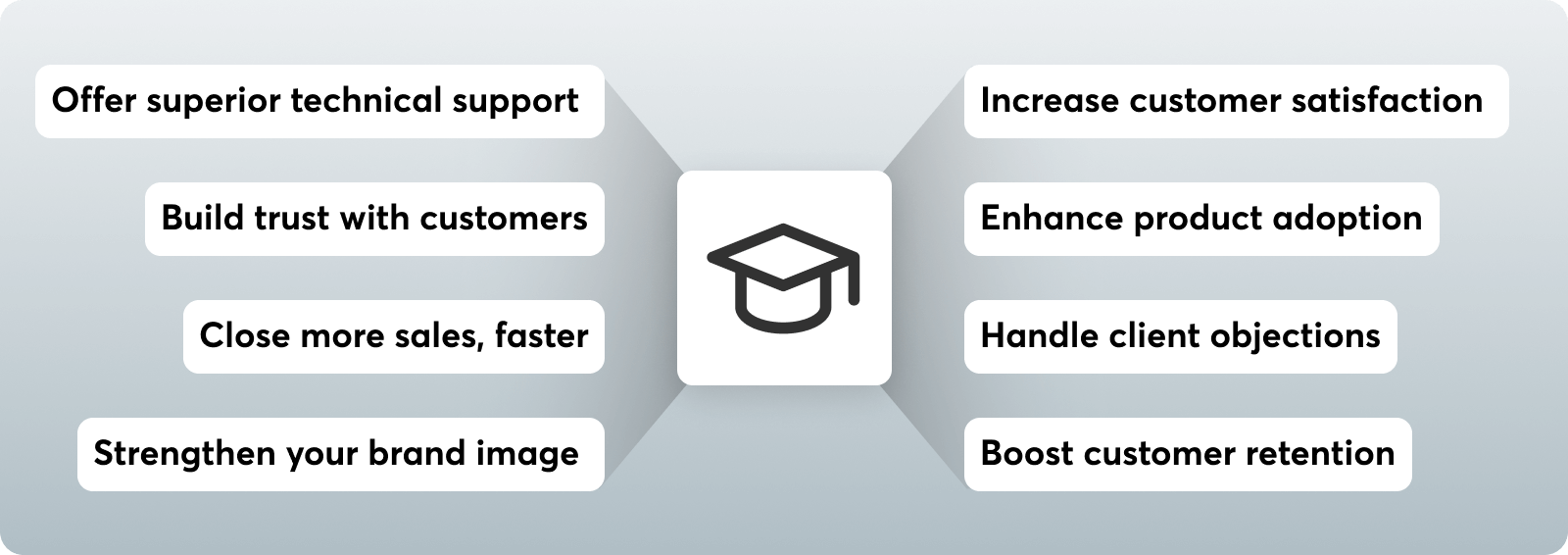Table of Contents
Product knowledge training is a training program that explains a product or service in detail, along with all its benefits and use cases. The scope of product knowledge training is to enable the learner to use, sell, or promote the product effectively, depending on their role.
Product knowledge is not only about exploring product features and functionalities – a full-fledged training program offers a deep understanding of a product’s position in the market and its target audience. This way, employees have a rounded view of the product and the problems it solves, as well as how it compares to similar offerings.
Product knowledge concerns companies across diverse industries, such as those selling SaaS or tech products, retail, and financial services. It’s also common among industries like manufacturing and healthcare, where knowing how to use the product is pivotal for the user’s safety.
In this post, we’ll dive deep into product knowledge training and explain why it’s important, what it entails, who it’s for, and how to deploy engaging and effective product knowledge for different audiences.
Why is Product Knowledge Important?

Product knowledge is essential for all customer-facing employees, first and foremost, and for customers too.
Whether a sales rep tries to close a sale or a customer support agent replies to a ticket, product knowledge training equips employees with the skills they need to provide a superior customer experience and effectively meet customer needs: the sales rep will guide the client toward the best solution for their needs, and the customer support agent will reply swiftly and solve the issue without referring the customer to a superior or putting them on hold.
At every touchpoint during the customer journey, well-versed employees serve clients better and, therefore, inspire trust. This directly reflects on your brand – if the customer trusts your employee, they trust your brand as well.
The benefits of product knowledge in a nutshell:
Who Needs Product Knowledge?
Let’s start by saying that every new employee needs to know about your product, from Val on your sales team to Mary in finance. Therefore, product knowledge should always be part of new hire training, even if the depth of the course will vary.
Overall, the following groups are the most common recipients of product training:
Sales Representatives
Product training is an indispensable part of your sales training and sales enablement strategy. A salesperson is often the first person customers interact with. And even if they’re not the first, they’re the ones customers interact and associate your brand with the most.
Whether selling online or in physical stores, sales staff need to know the ins and outs of your product or service. It’s the most effective way they will build trust and present the product enthusiastically and in detail, so each customer can see its value and how it addresses their specific needs.
Product knowledge will also help them effectively address customer questions, overcome client objections, and promote complementary products (upsell).
Customer Success Managers
Customer success managers are most common with SaaS B2B products and deal with top-tier clients. Therefore, they should be able to serve them in an impeccable manner, resolve any issues that arise, and answer questions with confidence, ideally without having to refer the client to another team member.
Product training enables them to achieve in-depth knowledge to assist their clients and ensure a smooth customer experience.
Customer Support Agents
Similar to customer success managers, your support team needs thorough knowledge and quick access to a comprehensive knowledge base that will help them troubleshoot and resolve tickets in a timely and efficient manner.
Along with your customer success and sales team, these three groups are top priorities when it comes to product knowledge training; they’re the people customers come the most in contact with and have a huge impact on how they perceive your company.
Therefore, they need to be fully aligned with your brand image and offer consistent, high-level customer service that reflects your values and ethics.
External Partners
Affiliates, resellers, distributors, and other external partners will also greatly benefit from product knowledge. External partners need to understand your product and its benefits so they can promote it to the clients that the product will fit best, and in a way that will convince them of the superiority of your product over competitive ones.
Marketing Team
Your marketing department is also required to “sell” your company’s product, even indirectly. Anyone involved in product marketing needs to be able to position it in a favorable light and differentiate it from competitors’ products.
This is possible only through training sessions that focus mostly on customer profile, brand image, and industry knowledge. This group doesn’t need to know every little button and setting but rather the benefits and use cases your product features translate into.
Customers
Last but not least, customers also need to receive a type of product knowledge training, which is most commonly referred to as customer onboarding or customer education.
Product education is also an integral part of the product offering and can significantly impact the probability of closing deals thanks to the perceived additional value.
In some cases, like in healthcare, product training is not a nice thing but a requirement to prove that the user is qualified to use the product or has become a product expert. In such cases, you also need to increase the difficulty level with assessments and offer a certificate at the end of the training course.
What Does Product Knowledge Training Entail?
Product knowledge is more than exploring product features. A comprehensive program should introduce learners to related knowledge so they have the full picture: brand image, industry and competition, and ideal customer persona.
Let’s see these elements of product knowledge in more detail.
Product Training
Product training is focused on showing how your product works. It is at the core of product knowledge, and its difficulty level and focus vary depending on who it is aimed for.
For example, product training needs to be as detailed and thorough as possible for customer-facing teams, especially for those answering technical questions.
Meanwhile, product training for your partners or your sales & marketing teams should focus on linking product features to benefits and use cases.
Brand Image
In the same way that retail staff often wear the same outfits so customers can tell who they are, any salesperson should handle clients and present themselves in a specific manner that reflects your brand image.
In other words, all employees (and that includes those who do not directly interact with clients) must know the story behind your brand, your tone of voice, and your messaging, so they can deliver the same message across all touchpoints – a message that aligns with your values and mission and resonates with your customers.
Industry Knowledge
Customers are more knowledgeable than ever, and so should your sales reps and marketers. Ensure they stay on top of industry trends and the current state of the competition.
This will not only provide a better understanding of your own product and how it meets current customer needs; it will also help them identify key differentiators, brainstorm ideas for feature releases, position the product favorably, and be better prepared for customer objections.
Customer Profile
Knowing your product is one part of the equation. On the other end stands who it’s made for, your customers. This means that sales reps and marketers must understand the customer goals, pain points, and key motivators.
6 Tips for Deploying Product Knowledge Training
As you can see, product knowledge can get complicated. Therefore, you need to have a solid plan for rolling out your program to suit the needs of different learners. Let us help you with that with 6 foolproof tips:
Use a Learning Management System (LMS)
A Learning Management System will literally untie your hands. With a versatile LMS like LearnWorlds, you will have access to features that will help you build and deliver training programs tailored to the unique needs of your diverse audiences.
Here is a taste of what you’ll be able to do with LearnWorlds:
Discover these and many more features with a LearnWorlds 30-day free trial!
Use Microlearning
Short and sweet training modules are very effective for product knowledge training. Being bite-sized and designed to be easily comprehensible, microlearning offers unique benefits:
Offer Diverse Training Resources
Like with any training course, product knowledge must include a variety of content to satisfy different learning preferences and training needs to achieve maximum learner engagement and better comprehension.
In our experience, this is the content that works best for our clients:
Customize per Role
Remember Mary in finance, who only needs some basic product information? Well, Jen in the product development team might need some more training, as she needs to become a product expert to brainstorm and advance the product further.
This means that you can’t deploy just one product knowledge program and disseminate it as is. Create different versions of your course depending on who the audience is.
You don’t want to overwhelm people who are not deeply involved in the product with too much detail, nor leave those who need to know it best with important questions.
Leverage AI
Customizing your training program to meet the requirements of each audience sounds like hard and time-consuming work. But it doesn’t have to be! We are lucky to live in an era where technology has advanced to the point where Artificial Intelligence has become our best business partner.
Use AI tools – some, like ChatGPT, are even available for free – to repurpose and modify content faster. If your LMS offers an AI assistant, even better. For example, with LearnWorlds AI assistant, you can easily create, edit, and repurpose content or even build your course plan using pre-built prompts! So even if you know very little about AI, we have made it very easy for you to use our AI tool to build an engaging and effective course.
Continuously Evaluate & Update
Make sure your training program is beneficial for all intended audiences by tracking important data from different sources. For example, you can:
Analyze the insights to tweak your program and continuously improve it. You should also refresh your learning material with every new product or feature update to ensure everyone is on the same page.
Moving Forward With Product Knowledge
There’s no questioning the importance of product knowledge, which is the building block for a competent workforce and empowered customers. Therefore, it should be part of your overall employee training or customer education strategy.
As we review the best practices and “jobs to be done” for a scalable and custom-made training program, it becomes evident that a lightweight Learning Management System like LearnWorlds can support your efforts every step of the way.
Join more than 9,000 happy clients and start building your online academy today, with a 30-day free trial!
Further reading
- What is an LMS (Learning Management System)?
- The 19 Best Learning Management Systems
- SCORM 101: The Definitive Guide to Choose a SCORM Compliant LMS
- 18 Best Online Course Platforms Comparison Guide
- 10 Best WordPress LMS Plugins Comparison
- The Benefits of Mobile Learning: Unveiling Its Power and How It Works

Androniki Koumadoraki
Androniki is a Content Writer at LearnWorlds sharing Instructional Design and marketing tips. With solid experience in B2B writing and technical translation, she is passionate about learning and spreading knowledge. She is also an aspiring yogi, a book nerd, and a talented transponster.

